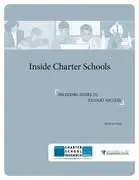From 2006-2010 the Inside Charter Schools initiative at the Center on Reinventing Public Education (CRPE) examined how charter schools differentiate themselves from traditional public schools to attract students and families and how they recruit and manage their staff. In this effort, CRPE researchers saw first hand the promise and potential pitfalls of school autonomy.
The research shows that allowing schools to develop their own mission, granting them freedom over their budgets and personnel, and holding them accountable for performance can have valuable effects in schools and for the educational system more broadly. The freedom given to charter schools can lead to new programs serving diverse needs, to higher expectations for low-income and minority students, to more school-focused professional norms for teachers and leaders, and to new ways to hire teacher and leader talent in schools.
Autonomy unlocks many doors, but new challenges lie behind them. Autonomy shifts responsibility to teachers and administrators in hope of encouraging local ingenuity and entrepreneurship. Lifting contractual mandates for teachers and creating smaller organizations that operate independent of a large district structure elevates the importance of teamwork and relationships in schools. Trust becomes an essential component in a school’s success and viability. As CRPE’s research makes clear, autonomy only creates the opportunity for high-quality schools; it by no means guarantees it.
This is the final report from the four-year Inside Charter Schools initiative.




